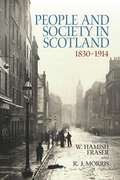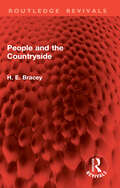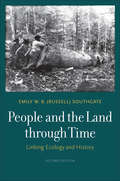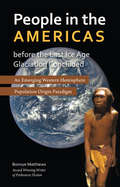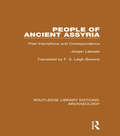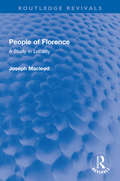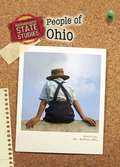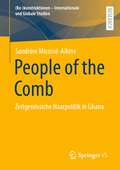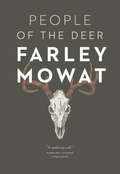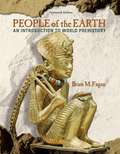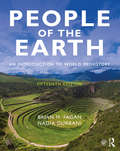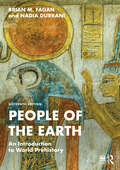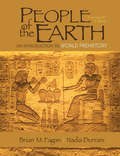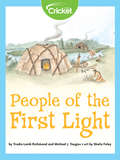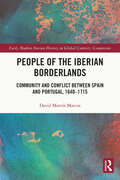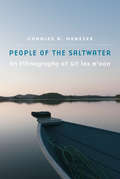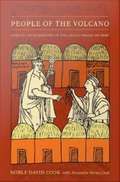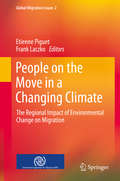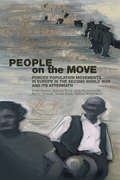- Table View
- List View
People and Society in Scotland, 1830–1914
by W. Hamish FraserThis is the second volume of a three-volume study of Scottish social change and development from the eighteenth century to the present day, originally published by John Donald in association with the Economic and Social History Society of Scotland. The series covers the history of industrialisation and urbanisation in Scottish society and records many experiences which Scotland shared in common with other societies, looking at the impact of those changes throughout the spectrum of society from croft, bothy and hunting lodge to mines, foundries and urban poor houses. The series is intended to illustrate the identity and distinctiveness of Scotland through its separate institutions and through areas such as language, law and religion and recognises Scotland as a multi-cultured society, the highland and lowland cultures being only two among several.
People and Spaces in Roman Military Bases
by Penelope M. AllisonThis study uses artefact distribution analyses to investigate the activities that took place inside early Roman imperial military bases. Focusing especially on non-combat activities, it explores the lives of families and other support personnel who are widely assumed to have inhabited civilian settlements outside the fortification walls. Spatial analyses, in GIS-type environments, are used to develop fresh perspectives on the range of people who lived within the walls of these military establishments, the various industrial, commercial, domestic and leisure activities in which they and combat personnel were involved, and the socio-spatial organisation of these activities and these establishments. The book includes examples of both legionary fortresses and auxiliary forts from the German provinces to demonstrate that more material-cultural approaches to the artefact assemblages from these sites give greater insights into how these military communities operated and demonstrate the problems of ascribing functions to buildings without investigating the full material record.
People and the Countryside (Routledge Revivals)
by H. E. BraceyRapid and radical changes were taking place in the countryside. Originally published in 1970, People and the Countryside discusses the legislation affecting the countryside which appeared in the late 1940s and the work of the Countryside in 1970 Conferences with which the author had been closely connected.The book examines the role played by man in the shaping of the British landscape, and discusses the considerable changes there have been in our time in, for example, the number and distribution of people over the country and the availability of work in the countryside. Dr Bracey assesses the influence of developments in mobility on life in the country, and looks at rural local government with especial regard to land-use planning.As more people used more of the countryside for many new purposes, there was a growing concern about access to open spaces, common land and forest, and about the provision of facilities and the conservation of amenities. Dr Bracey shows how the Countryside Act of 1968, which he describes as a townsman’s charter for the greater use of the countryside for recreation, at the same time pays heed to the needs of the countryside and the claims of country people. The final chapters of the book look at the Government White Paper, ‘Leisure in the Countryside’, and explore its real meaning in the context of leisure in general, the recreational use of land, the facilities needed for exploiting and conserving countryside amenities, and the need for ‘management’ of the countryside in the 1970s. Today it can be read in its historical context.
People and the Land through Time: Linking Ecology and History, Second Edition
by Emily W. SouthgateA revised and updated edition of a classic book that defines the field of historical ecologyPeople and the Land through Time, first published in 1997, remains the only introduction to the field of historical ecology from the perspective of ecology and ecosystem processes. Widely praised for its emphasis on the integration of historical information into scientific analyses, it will be useful to an interdisciplinary audience of students and professionals in ecology, conservation, history, archaeology, geography, and anthropology. This up-to-date second edition addresses current issues in historical ecology such as the proposed geological epoch, the Anthropocene; historical species dispersal and extinction; the impacts of past climatic fluctuations; and trends in sustainability and conservation.
People in the Americas Before the Last Ice Age Glaciation Concluded: An Emerging Western Hemisphere Population Origin Paradigm
by Bonnye MatthewsWARNING: Everything you know about the peopling of the Americas is wrong.People in the Americas before the Last Ice Age Glaciation Concluded: An Emerging Paradigm on Western Hemisphere Population Origin covers the turn of the century emerging science on the origin of human population in the western hemisphere. It is a booklet that is designed to provide a reference bridge until the new information can be included in textbook presentations. With the ability to examine DNA evidence on extremely old human remains and findings at greater depth than formerly considered, information grows at a rapid rate. The science is in its infancy, but surprising finds occur moment by moment.
People of Ancient Assyria: Their Inscriptions and Correspondence (Routledge Library Editions: Archaeology)
by Jørgen LæssøeWas Assyria merely a more brutal, more uncivilized and less interesting offshoot of the culture created by Sumerians and Babylonians in Southern Mesopotamia at the dawn of history? Do the Assyrian reliefs that fill our museums give a complete picture of the phenomenon that was Assyria? Was the contribution of this people to world culture merely an incredibly effective military organization? The answers to these questions are sought here in this detailed book from 1963, referring to personal documents of the time, in the letters Assyrians wrote to one another rather than in the annals of the rulers.
People of Florence: A Study in Locality (Routledge Revivals)
by Joseph MacleodFirst Published in 1968, People of Florence raises the question what makes a city? This is neither a guidebook nor a typical sociological treatise, but the portrait of a people. Trinkets of history are lightly painted in to give background to what the author calls ‘locality’: Florence of today as formed by her past and by the physical conditions of Tuscany. Two principal chapters are intimately concerned with the flood of 1966. The author also takes us through the relation between the individual liberties in Florence and the bureaucratic controls of the Government in Rome, along with the architecture, art, music, theatre, song birds, flowers, trees, food and drink, public ceremonies, games, ancient rites, and human stories. This book will be an interesting read for scholars and researchers of sociology, urban history, social anthropology, cultural studies and for general readers interested to know about Florence.
People of Michigan (Heinemann State Studies)
by Marcia SchonbergWho were the first people to live in Michigan? Which residents became famous, and why? This book contains fascinating stories of the many different people who have made Michigan what it is today. You will find information about the first people of Michigan and the settlers who came later. You'll also learn about the different cultural groups found in Michigan.
People of Ohio (Heinemann State Studies)
by Marcia SchonbergWhich presidents were born in Ohio? How has the population of Ohio changed over the years? You can find the answers to these questions in People of Ohio. This book contains fascinating stories of the many different people who have made Ohio what it is today. You will learn about the different cultural groups found in Ohio. You will find out why Ohio is not only the "Mother of Presidents," but the "Mother of Astronauts" and the "Mother of Inventors," too!
People of Substance
by Carlos Londono-SulkinPeople of Substance is a lively, accessible ethnography of a complex indigenous group of people of the Colombian Amazon who call themselves 'People of the Center. ' Carlos David Londoño Sulkin examines this group's understandings and practices relating to selfhood, social organization, livelihood, and symbolism. Through this, he makes a strong case for increased anthropological attention to morality and ethics.Londoño Sulkin explains a number of key issues and debates in Amazonian anthropology with great clarity, making People of Substance a useful text for students. At the same time, it is theoretically sophisticated, combining innovative research methods with sound analysis of empirically gathered material. Contributing both to accounts of regional history and to discussions on anthropology and history, People of Substance offers valuable engagement with concepts of structure, agency, and freedom.
People of the Comb: Zeitgenössiche Haarpolitik in Ghana ((Re-)konstruktionen - Internationale und Globale Studien)
by Sandrine Micossé-Aikins"Afrika" dient in vielen haarpolitischen Debatten nur als positive und teilweise sehr unpräzise definierte Projektionsfläche, die für eine bessere vorkoloniale Schwarze Welt steht. Nur wenig Aufmerksamkeit wurde bisher darauf verwendet, die tatsächlich gegenwärtig gelebte Haarkultur- und -politik in verschiedenen kontinentalafrikanischen Kontexten auch auf ihr Eingebettet-Sein in globale, historisch gewachsene Hierarchien hin zu betrachten. Oft wird übersehen, dass auch hier – auf ihre eigene Weise – rassistische Ideologien und insbesondere weiße Vorherrschaft als koloniale Kontinuitäten wirken, und zeitgenössische Haarkultur mitprägen. Die vorliegende Arbeit möchte einen Beitrag dazu leisten, diese Dynamiken besser zu verstehen. Dabei werden jedoch auch relevante Facetten Schwarzen Selbstverständnisses und gelebte ästhetische Praktiken beleuchtet, die über die Auseinandersetzung mit weißer Vorherrschaft hinausweisen.
People of the Deer
by Farley MowatIn 1886, the Ihalmiut of northern Canada numbered 7,000 souls; by 1946, when 25-year-old Farley Mowat travelled to the Arctic, their population had dwindled to only 40. Living among them, he observed the millennia-old migration of the caribou and endured the bleak winters, food shortages and continual, devastating intrusions of interlopers bent on exploiting the Arctic. In this seminal book, Mowat details a genocide wrought by misunderstanding and neglect. Debated long after its publication, this powerful story of the Ihalmiut continues to haunt the Canadian conscience.
People of the Earth: An Introduction to World Prehistory
by Brian M. FaganThis internationally renowned textbook provides the only truly global account of human prehistory from the earliest times through the earliest civilizations. Written in an accessible way, People of the Earth shows how today's diverse humanity developed biologically and culturally over millions of years against a background of constant climatic change.
People of the Earth: An Introduction to World Prehistory
by Brian M. Fagan Nadia DurraniPeople of the Earth is a narrative account of the prehistory of humankind from our origins over 3 million years ago to the first pre-industrial civilizations, beginning about 5,000 years ago. This is a global prehistory, which covers prehistoric times in every corner of the world, in a jargon-free style for newcomers to archaeology. Many world histories begin with the first civilizations. This book starts at the beginning of human history and summarizes the latest research into such major topics as human origins, the emergence and spread of modern humans, the first farming, and the origins of civilization. People of the Earth is unique in its even balance of the human past, its readily accessible style, and its flowing narrative that carries the reader through the long sweep of our past. The book is highly illustrated, and features boxes and sidebars describing key dating methods and important archaeological sites. This classic world prehistory sets the standard for books on the subject and is the most widely used prehistory textbook in the world. It is aimed at introductory students in archaeology and anthropology taking survey courses on the prehistoric past, as well as more advanced readers. It will also appeal to students of human responses to climatic and environmental change.
People of the Earth: An Introduction to World Prehistory
by Brian M. Fagan Nadia DurraniPeople of the Earth is a narrative account of the prehistory of humankind from our origins over 6 million years ago to the first pre-industrial states, beginning about 5,000 years ago. This is a global prehistory, which covers prehistoric times in every corner of the world in a jargon-free style for newcomers to archaeology. Many world histories begin with the first pre-industrial states. This book starts at the beginning of human history and summarizes the latest research into such major topics as human origins, the emergence and spread of modern humans, the first farming, and the origins of civilization. People of the Earth is unique in its even balance of the human past, its readily accessible style, and its flowing narrative that carries the reader through the long sweep of our past. The book is highly illustrated and features boxes and sidebars describing key dating methods and important archaeological sites. This classic world prehistory sets the standard for books on the subject and is the most widely used such textbook in the world. It is aimed at introductory students in archaeology and anthropology taking survey courses on the prehistoric past, as well as more advanced readers. It will also appeal to students of human responses to climatic and environmental change.
People of the Earth: An Introduction to World Prehistory
by Dr Brian Fagan Nadia DurraniUnderstand major developments of human prehistory People of the Earth: An Introduction to World Prehistory 14/e, provides an exciting journey though the 7-million-year-old panorama of humankind's past. This internationally renowned text provides the only truly global account of human prehistory from the earliest times through the earliest civilizations. Written in an accessible way for beginning students, People of the Earth shows how today's diverse humanity developed biologically and culturally over millions of years against a background of constant climatic change.
People of the First Light
by Trudie Lamb RichmondThe Wampanoags, who inhabited what it is now southeastern Massachusetts, were strikingly different from the Pilgrims, who did not share the same interests in sharing land. The native people could not foresee Europeans taking the land that the Wampanoags had once respected and treasured.
People of the Iberian Borderlands: Community and Conflict between Spain and Portugal, 1640–1715 (Early Modern Iberian History in Global Contexts)
by David Martín MarcosThis book is devoted to the inhabitants of the Spanish–Portuguese borderlands during the early modern period. It seeks to challenge a predominant historiography focused on the study of borderlands societies, relying exclusively on the antagonistic topics of subversion and the construction of boundaries. It states that by focusing just on one concept or another there is a restrictive understanding tending to condition the agency of local communities by external narratives. Thus, if traditionally border people were reduced by some scholars to actors of a struggle against a supposedly imposed border; in a more modern perspective, their behaviors have been also framed in bottom-up processes of consolidation of spaces of sovereignty in a no less limiting vision. Faced with both approaches, the objective of this work is not to deny them but, first and foremost, to situate the experiences of border populations outside of logics that I understand as originally alien to themselves, and to highlight their own subjectivity. Finally, it also demonstrates that most of the practices developed by border people were fundamentally aimed at defending their local communities. It will be useful for both audiences interested in early modern Iberia or border studies from a bottom-up perspective.
People of the Iberian Borderlands: Community and Conflict between Spain and Portugal, 1640–1715 (Early Modern Iberian History in Global Contexts)
by David Martín MarcosThis book is devoted to the inhabitants of the Spanish–Portuguese borderlands during the early modern period. It seeks to challenge a predominant historiography focused on the study of borderlands societies, relying exclusively on the antagonistic topics of subversion and the construction of boundaries. It states that by focusing just on one concept or another there is a restrictive understanding tending to condition the agency of local communities by external narratives. Thus, if traditionally border people were reduced by some scholars to actors of a struggle against a supposedly imposed border; in a more modern perspective, their behaviors have been also framed in bottom-up processes of consolidation of spaces of sovereignty in a no less limiting vision. Faced with both approaches, the objective of this work is not to deny them but, first and foremost, to situate the experiences of border populations outside of logics that I understand as originally alien to themselves, and to highlight their own subjectivity. Finally, it also demonstrates that most of the practices developed by border people were fundamentally aimed at defending their local communities.It will be useful for both audiences interested in early modern Iberia or border studies from a bottom-up perspective.
People of the Lake: Mankind and its Beginnings
by Richard E. Leakey Roger LewinIn the crocodile-infested waters near Lake Turkana in Kenya, Leaky is piecing together the clues of an ancient puzzle, reconstructing the world of our primeval forefathers in eerie detail.
People of the Saltwater: An Ethnography of Git lax m'oon
by Charles R. MenziesA 2017 Choice Outstanding Academic Title In People of the Saltwater, Charles R. Menzies explores the history of an ancient Tsimshian community, focusing on the people and their enduring place in the modern world. The Gitxaała Nation has called the rugged north coast of British Columbia home for millennia, proudly maintaining its territory and traditional way of life.People of the Saltwater first outlines the social and political relations that constitute Gitxaała society. Although these traditionalist relations have undergone change, they have endured through colonialism and the emergence of the industrial capitalist economy. It is of fundamental importance to this society to link its past to its present in all spheres of life, from its understanding of its hereditary leaders to the continuance of its ancient ceremonies. Menzies then turns to a discussion of an economy based on natural-resource extraction by examining fisheries and their central importance to the Gitxaałas’ cultural roots. Not only do these fisheries support the Gitxaała Nation economically, they also serve as a source of distinct cultural identity. Menzies’s firsthand account describes the group’s place within cultural anthropology and the importance of its lifeways, traditions, and histories in nontraditional society today.
People of the Volcano: Andean Counterpoint in the Colca Valley of Peru
by Noble David Cook Alexandra Parma CookWhile it now attracts many tourists, the Colca Valley of Peru's southern Andes was largely isolated from the outside world until the 1970s, when a passable road was built linking the valley--and its colonial churches, terraced hillsides, and deep canyon--to the city of Arequipa and its airport, eight hours away. Noble David Cook and his co-researcher Alexandra Parma Cook have been studying the Colca Valley since 1974, and this detailed ethnohistory reflects their decades-long engagement with the valley, its history, and its people. Drawing on unusually rich surviving documentary evidence, they explore the cultural transformations experienced by the first three generations of Indians and Europeans in the region following the Spanish conquest of the Incas. Social structures, the domestic export and economies, and spiritual spheres within native Andean communities are key elements of analysis. Also highlighted is the persistence of duality in the Andean world: perceived dichotomies such as those between the coast and the highlands, Europeans and Indo-Peruvians. Even before the conquest, the Cabana and Collagua communities sharing the Colca Valley were divided according to kinship and location. The Incas, and then the Spanish, capitalized on these divisions, incorporating them into their state structure in order to administer the area more effectively, but Colca Valley peoples resisted total assimilation into either. Colca Valley communities have shown a remarkable tenacity in retaining their social, economic, and cultural practices while accommodating various assimilationist efforts over the centuries. Today's population maintains similarities with their ancestors of more than five hundred years ago--in language, agricultural practices, daily rituals, familial relationships, and practices of reciprocity. They also retain links to ecological phenomena, including the volcanoes from which they believe they emerged and continue to venerate.
People on the Move in a Changing Climate
by Etienne Piguet Frank LaczkoPolicymakers around the world are increasingly concerned about the likely impact of climate change and environmental degradation on the movement of people. This book takes a hard look at the existing evidence available to policymakers in different regions of the world. How much do we really know about the impact of environmental change on migration? How will different regions of the world be affected in the future? Is there evidence to show that migration can help countries adapt to environmental change ? What types of research have been conducted, how reliable is the evidence? These are some of the questions considered in this book, which presents, for the first time, a synthesis of relevant research findings for each major region of the world. Written by regional experts, the book provides a comprehensive overview of the key findings of existing studies on the linkages between environmental change and the movement of people. More and more reports on migration and the environment are being published, but the information is often scattered between countries and within regions, and it is not always clear how much of this information is based on solid research. This book brings this evidence together for the first time, highlighting innovative studies and research gaps. In doing this, the book seeks to help decision-makers draw lessons from existing studies and to identify priorities for further research.
People on the Move: Forced Population Movements in Europe in the Second World War and its Aftermath
by Pertti Ahonen; Gustavo Corni; Jerzy Kochanowski; Rainer Schulze; Tamás Stark; Barbara Stelzl-MarxEurope has a long history of state-led population displacement on ethnic grounds. The nationalist argument of ethnic homogeneity has been a crucial factor in the mapping of the continent. At no time has this been more the case than during and after the Second World War. Both under the aggressive expansionism of the Third Reich and after Germany's defeat, millions were brutally forced out of their homelands. Presenting a history from the top as well as the bottom, People on the Move reconstructs the complex map of forced population displacements that took place across Europe during and immediately after the Second World War.
